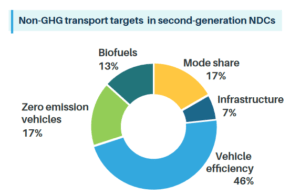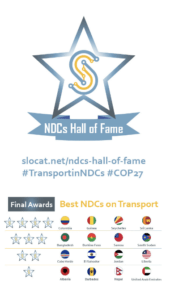14 October 2022 In Adaptation, Advocacy and Engagement, Africa, Blog Post, Climate Change, Mitigation
Raising Ambition for Transport in African Countries’ Climate Strategies
Here is a picture of Kwame, owner of a dilapidated car which he uses to buy and sell goods in the capital city of Yaounde, Cameroon.
Photo courtesy of SLOCAT / Cabrel Tokam (2022).
Kwame, a father of four who was born and raised in Cameroon, Africa owns a 19-year-old dilapidated vehicle which carries him and his family through the traffic-clogged streets of Yaounde, Cameroon’s capital. However old, his vehicle is his main mobility choice and source of income, which enables him to be a successful trader, merchant and entrepreneur.
“I consider myself a businessman today. My saviour allows me to go to the countryside (50km from the city centre) to buy agricultural products and sell them here in Yaounde. Thanks to my car, I now own two buildings and I am able to open a shop for my wife where she sells beauty products,” said Kwame.
Like Kwame, the livelihood of millions of Africans are dependent on used vehicles, minibuses and vans imported from abroad. Nonetheless, rapid increase in private motorisation comes at a high cost to societies and the planet, including surging green-house gas (GHG) emissions, air pollution, road traffic accidents, congestion, among others. Although motorised transport volumes in Africa are the lowest among other regions in the world, car ownership rates are rising, with some countries experiencing growth of 250% or more between 2005 and 2015. While Africa had the lowest transport CO2 levels among all regions in 2019, its transport emissions increased by 27% between 2010 and 2019, the second highest regional growth rate after Asia (41%). Africa also has the highest rate of road fatalities, with nearly 40% of these deaths involving pedestrians and another 4% involving cyclists. Road accidents are most often caused by used vehicles, the majority of which have defective or missing components. Although so far contributing little to the world’s total global GHG emissions, Africa is suffering enormously from the adverse effects of climate change (irregular agricultural seasons in Cameroon, floods in Niger, droughts in Madagascar, among many others). Imminent actions are needed!
Raising ambition for transport in national climate strategies
Under the 2015 Paris Agreement on Climate Change, 196 Parties adopted the collective goal to limit global warming to well below 2, preferably to 1.5ºC, compared to pre-industrial levels. Nationally Determined Contributions (NDCs) serve as the country-specific building blocks that support this collective goal. In the same vein, countries have adopted Long-term Strategy (LTS), which is a policy tool that establishes a vision and pathway towards sustainable, low-emissions development by 2050, and helps national planners understand the actions needed to achieve that vision while also supporting national climate commitments. These national climate strategies outline specific mitigation actions, adaptation plans and financing needs to meet their climate goals. The Intergovernmental Panel on Climate Change (IPCC) underlines that a pathway for transport which contributes to maintaining global temperature rise below 1.5ºC is possible. This seems particularly important for the Africa region, which is experiencing rapid population growth and an increasing number of used and polluting vehicles that nevertheless play an essential role in the socio-economic activities of the populations on a daily basis.
Transformation of mobility and transport systems for an equitable 1.5ºC Planet must be prioritised in every NDCs and LTS submitted by African countries. An analysis of NDCs and LTS jointly conducted by SLOCAT and GIZ shows that 42 of the 54 countries in Africa (78%) have submitted updated or second NDCs, a much higher proportion than in other regions. However, 40% of transport emissions in the region are still not accounted for in second-generation NDCs. Many NDCs and LTS submitted by African countries include targets for the transport sector. Among them, 8 African countries commit to targets to reduce transport GHG emissions and 13 countries include other types of transport targets, such as vehicle efficiency, zero emission vehicles, mode share, biofuels and transport infrastructure (Figure 2). Compared to all submitted NDCs globally, targets on zero emission vehicles play a much smaller role in African NDCs, while biofuels and mode share targets are more prevalent.


Figure 2: GHG transport targets and non-GHG transport targets
in second-generation NDCs submitted by African countries
Second-generation NDCs submitted by African countries include a variety of transport mitigation and adaptation actions. Transport mitigation actions focus primarily on mode shift and demand management, followed by fuels and energy vectors and system improvements . While adaptation actions are mainly relating to road infrastructure resilience, mostly incorporated into the planning and design of transport infrastructure and systems.

Figure 3: Transport adaptation (a) and mitigation (b)
in second-generation NDCs submitted by African countries
Transport emissions in Africa could be further reduced if countries that have yet to update their climate strategies include more ambitious transport targets in their forthcoming strategies. Egypt, host country of the United Nations Climate Change Conference 2022 (COP27), submitted its NDC in October 2022 – just in time for the important international occasion – with a specific target to limit transport GHG emission growth to 7% below the business-as-usual scenario in 2030.
 To illustrate how countries can enhance the transport dimension of their NDCs and hence enable passenger and freight transport systems for equitable, decarbonised, resilient pathways, the NDC Hall of Fame by SLOCAT puts the spotlight on the major transport strengths and issues in the second generation NDCs submitted so far. African countries, including Guinea, Seychelles, Burkina Faso and South Sudan, are among best-performing NDCs in terms of transport ambition and action.
To illustrate how countries can enhance the transport dimension of their NDCs and hence enable passenger and freight transport systems for equitable, decarbonised, resilient pathways, the NDC Hall of Fame by SLOCAT puts the spotlight on the major transport strengths and issues in the second generation NDCs submitted so far. African countries, including Guinea, Seychelles, Burkina Faso and South Sudan, are among best-performing NDCs in terms of transport ambition and action.
Although efforts are clearly visible, there much work remains for African countries to raise ambition for transport in NDCs, mainly through:
- Making freight a central component of NDC measures;
- Harnessing Africa’s full renewable energy potential to support electrification and reduce transport sector emissions; and
- promoting green recovery as an alternative option for financing the transition to zero-emission transport in African NDCs.
Thus, even if Kwame, like many Cameroonians, might not be aware of his country’s NDC and does not integrate climate considerations into his daily transport choices, the NDC will contribute to a equitable, decarbonised, resilient mobility future for him, his family and future generations to come. Raising public awareness on national strategies for climate change is pivotal in curating behavioural change and societal support to further accelerate these transformations. These include awareness-raising campaigns and multimedia products aimed at both decision-makers and the general public (all road users), a comprehensive set of guidance notes, advice, tools and training manuals, as well as open climate forums to raise the prominence of transport issues on the African climate agenda.
In November 2022, global leaders will once again convene in Egypt for COP27. At this African COP, we have a unique opportunity to shape the transport agenda and ensure that this COP serves and meets our needs. While the increase in debt and the COVID-19 pandemic have weakened African countries’ ability to deal with the climate crisis, COP27 is an opportunity more than ever for our continent’s negotiators to recognise that transport actions in NDCs represent the most ambitious contributions to the Paris Agreement on climate change and that they require climate finance resources that should be accessed through bilateral and multilateral channels. We cannot afford to fail! We cannot let Kwame lose his livelihood.

Cabrel Tokam
Cabrel Tokam is a junior specialist in pro-poor rural and urban transport sector development and management, with experience in the private sector, research institutes, and international organisations. Recognised for bringing public policy and innovative scientific and technological solutions to achieve better urban governance, planning, and management. He is one of the five SLOCAT-VREF Young Leaders in Sustainable Transport (2021-2022).

Cabrel Tokam
Cabrel Tokam is a junior specialist in pro-poor rural and urban transport sector development and management, with experience in the private sector, research institutes, and international organisations. Recognised for bringing public policy and innovative scientific and technological solutions to achieve better urban governance, planning, and management. He is one of the five SLOCAT-VREF Young Leaders in Sustainable Transport (2021-2022).